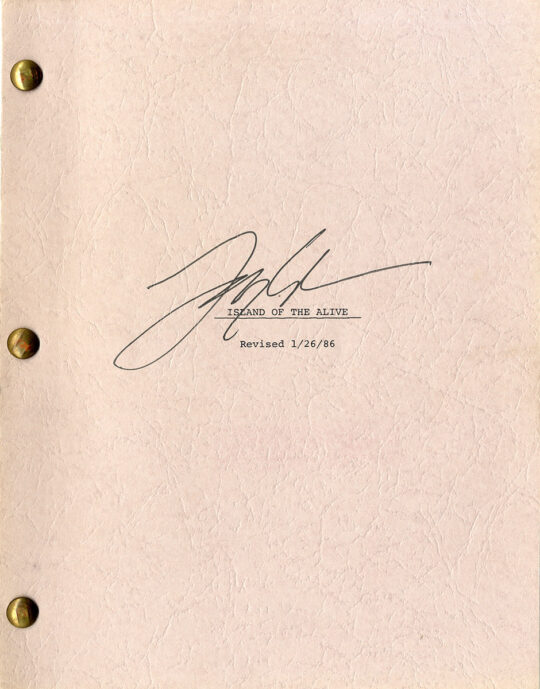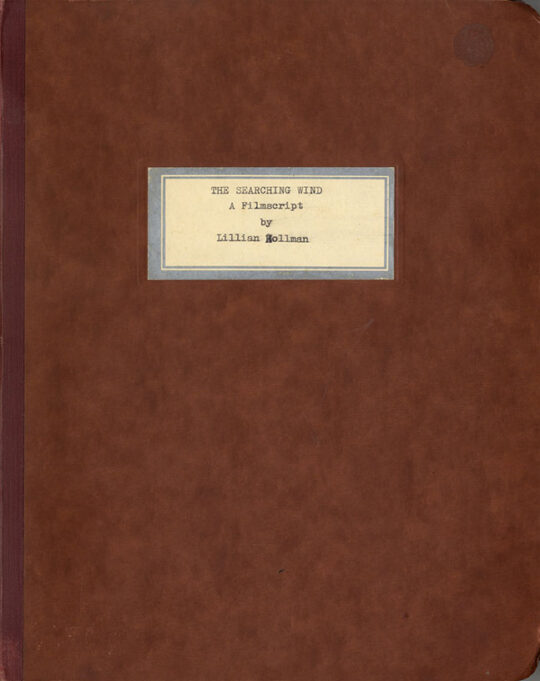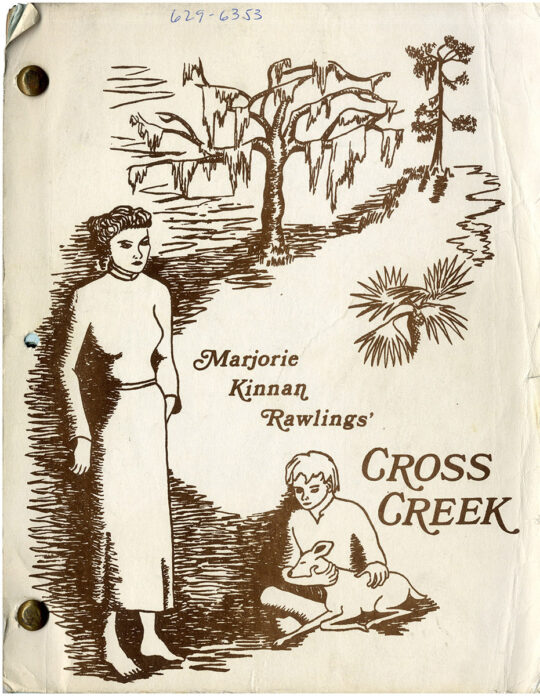THREEPENNY OPERA, THE [DIE DREIGROSCHEN OPER] (Mar 15, 1951) Theatre script
English adaptation by Marc Blitzstein. New York: Tams-Witmark, [ca. 1956] Vintage original script, quarto, mimeograph, brad bound in gray wrappers, [3],30,28,20 pp. Some wear to edges of blank yapped wrappers, overall JUST ABOUT FINE in VERY GOOD wrappers. Title page on a blue-green paper, the rest on yellow paper.
With music by Kurt Weill and text and lyrics by Bertold Brecht, this musical play was one of the cornerstone dramatic works of the Weimar Republic — and it was subsequently banned by the Nazis. It was an unfamiliar work in the US until the debut off-Broadway production, with a new English adaptation by Marc Blitzstein, The show highlighted Lotte Lenya, Kurt Weill’s widow, in the role of Jenny, which she had created in the original Berlin production, decades earlier.
“‘Marc Blitzstein,’ said Orson Welles in 1984, ‘was almost a saint. He was so totally and serenely convinced of the Eden which was waiting for us all [on] the other side of the Revolution that there was no way of talking politics to him. He didn’t care who was in the Senate, or what Mr. Roosevelt said — [Roosevelt] was just the spokesman for the bourgeoisie! When he came into the room the lights got brighter. He was an engine, a rocket, directed in one direction which was his opera [The Cradle Will Rock] — which he almost believed had only to be performed to start the Revolution.‘” (http://www.masterworksbroadway.com/artist/marc-blitzstein)
Blitzstein is an example of a gay artist who was drawn to the creation of socially relevant music and theatre. Among his most famous works are THE CRADLE WILL ROCK, which he created with Orson Welles, and REGINA, his operatic adaptation of Hellman’s THE LITTLE FOXES. At the time of his tragic death (he was murdered by sailors whom he met in Martinique), he left unfinished an opera about Sacco and Vanzetti.
After an initial run of 96 performances, after a debut on March 10, 1954, the play was revived in September, 1955, and experienced a great success, with performances running at the Theater de Lys for six years. This script makes reference on one of its preliminary pages to the show winning two Tony Awards on April 1, 1956, and so we are sure that this script was printed sometime after that date, but (based on the paper) probably shortly after.
Out of stock
Related products
-

IT’S ALIVE III: ISLAND OF THE ALIVE (1986) Larry Cohen-signed archive
$650.00 Add to cart -

SEARCHING WIND, THE (Nov 7, 1946) Final White script by Lillian Hellman
$1,500.00 Add to cart -

CROSS CREEK (Feb 9, 1982) Rev Final Shooting script by Dalene Young
$750.00 Add to cart -
![ESCAPADE [working title for: A WARM DECEMBER] (Jun 11, 1971) Revised First Draft screenplay](https://www.walterfilm.com/wp-content/uploads/2021/04/EscapadeSCR_a-540x695.jpg)
ESCAPADE [working title for: A WARM DECEMBER] (Jun 11, 1971) Revised First Draft screenplay
$500.00 Add to cart

![THREEPENNY OPERA, THE [DIE DREIGROSCHEN OPER] (Mar 15, 1951) Theatre script](https://www.walterfilm.com/wp-content/uploads/2019/04/ThreepennyOperaTheSCR_b.jpg)
![THREEPENNY OPERA, THE [DIE DREIGROSCHEN OPER] (Mar 15, 1951) Theatre script - Image 2](https://www.walterfilm.com/wp-content/uploads/2019/04/ThreepennyOperaTheSCR.jpg)
![THREEPENNY OPERA, THE [DIE DREIGROSCHEN OPER] (Mar 15, 1951) Theatre script - Image 3](https://www.walterfilm.com/wp-content/uploads/2019/04/ThreepennyOperaTheSCR_d.jpg)
![THREEPENNY OPERA, THE [DIE DREIGROSCHEN OPER] (Mar 15, 1951) Theatre script - Image 4](https://www.walterfilm.com/wp-content/uploads/2019/04/ThreepennyOperaTheSCR_c.jpg)